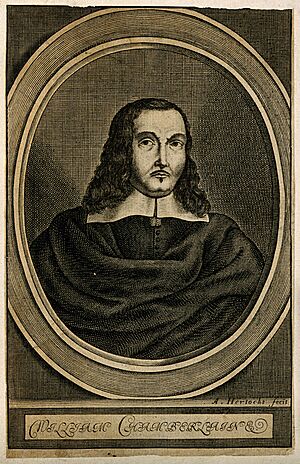William Chamberlayne (poet) facts for kids
William Chamberlayne (born in 1619 – died in 1679 or 1689) was an English poet. He was also a doctor.
Contents
Who Was William Chamberlayne?
William Chamberlayne was a writer and a physician. Not much is known about his early life. We know he worked as a doctor in a town called Shaftesbury in Dorset, England.
Chamberlayne and the English Civil War
During the English Civil War, William Chamberlayne fought for the Royalist side. This means he supported King Charles I. He took part in a big battle called the Second Battle of Newbury. This battle happened in 1644.
What Did William Chamberlayne Write?
William Chamberlayne wrote several interesting works. These included long poems and plays for the theater.
His Main Works
- Pharonnida (1659): This was a long poem, like a story told in verse. It had five parts.
- Love's Victory (1658): This was a play, a type of tragi-comedy. It was performed on stage in 1678, but with a different name.
- England's Jubilee (1660): This poem celebrated a very important event. It was written to honor the English Restoration. This was when the monarchy was brought back to England after the Civil War.
Other Writings
In 1683, a version of his poem Pharonnida was rewritten as a prose story. This means it was written like a regular book, not in verse. It was called Eromena, or the Noble Stranger.
In 1677, another one of his plays was performed. It was a comedy called Wits Led by the Nose. This play was shown at the Theatre Royal, Drury Lane in London.
Why Was His Work Important?
William Chamberlayne's work was enjoyed by many people. The famous poet Robert Southey said that Chamberlayne was a poet he loved to read. He said Chamberlayne gave him "many hours of delight."
His long poem Pharonnida was printed again in 1820 and then in 1905. Even though the poem's structure was a bit loose, it had parts that were considered very beautiful.
 | Kyle Baker |
 | Joseph Yoakum |
 | Laura Wheeler Waring |
 | Henry Ossawa Tanner |


